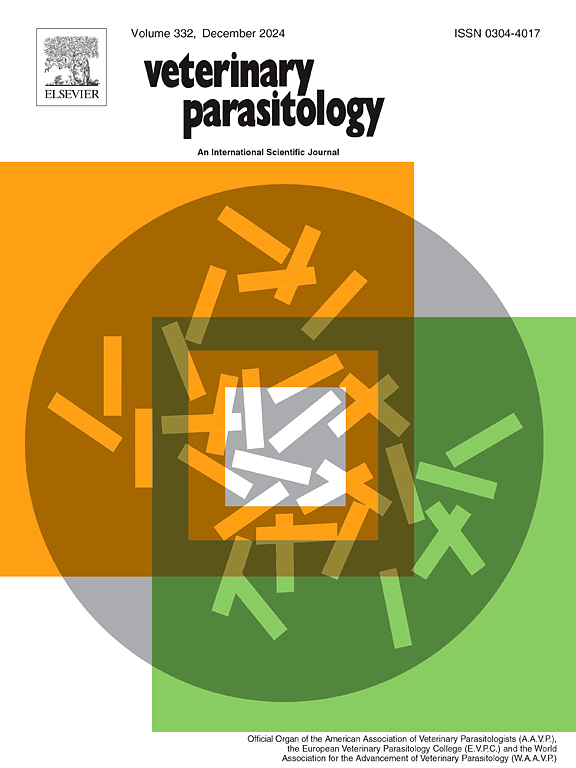Trichinella findings in Germany from 2013 to 2023 indicate an increased prevalence in wild boar (Sus scrofa) population
IF 2
2区 农林科学
Q2 PARASITOLOGY
引用次数: 0
Abstract
In Germany, Trichinella spp. are mainly detected in the sylvatic cycle. Here, the affected animal species are wild boar, fox, badger, raccoon dog, wolf, raccoon and golden jackal. The predominantly detected species are T. spiralis, followed by T. pseudospiralis and T. britovi. Due to legal requirements in Germany, all hunted wild boars and other susceptible animals must be examined for Trichinella spp. if their meat is intended for human consumption. In recent years, an increase in the number of Trichinella-positive wild boar shot in Germany has been registered and the prevalence of positive wild boar scaled up from 0.002 % to 0.005 % between 2013 and 2023. Regarding regional distribution, most Trichinella findings in wild boar have been registered in the North-Eastern part of Germany. Here, the federal states Western-Pomerania, Brandenburg and Saxony that are bordering to Poland are particularly affected. The increase in positive wild boar may be associated with the spread of raccoon dogs and wolves in these regions. Thus, measures are required to prevent the spread of Trichinella among wild animals and to follow the systematic meat inspection in susceptible wild animals intended for food especially wild boar.
从 2013 年到 2023 年,德国的毛线虫研究结果表明,野猪(Sus scrofa)中的毛线虫流行率有所上升。
在德国,毛旋蓟马主要是在溪流循环中发现的。受影响的动物种类包括野猪、狐狸、獾、浣熊犬、狼、浣熊和金豺。主要检测到的物种是螺旋蓟马,其次是假螺旋蓟马和布里托维蓟马。根据德国的法律规定,如果猎杀的野猪和其他易感动物的肉要供人类食用,则必须对其进行旋毛虫检查。近年来,德国发现的旋毛虫阳性野猪数量有所增加,2013 年至 2023 年间,阳性野猪的发病率从 0.002 % 上升到 0.005 %。在地区分布方面,大多数野猪旋毛虫感染病例发生在德国东北部地区。与波兰接壤的西波美拉尼亚州、勃兰登堡州和萨克森州尤其受到影响。阳性野猪的增加可能与浣熊犬和狼在这些地区的蔓延有关。因此,需要采取措施防止旋毛虫在野生动物中传播,并对用于食用的易感野生动物(尤其是野猪)进行系统的肉类检查。
本文章由计算机程序翻译,如有差异,请以英文原文为准。
求助全文
约1分钟内获得全文
求助全文
来源期刊

Veterinary parasitology
农林科学-寄生虫学
CiteScore
5.30
自引率
7.70%
发文量
126
审稿时长
36 days
期刊介绍:
The journal Veterinary Parasitology has an open access mirror journal,Veterinary Parasitology: X, sharing the same aims and scope, editorial team, submission system and rigorous peer review.
This journal is concerned with those aspects of helminthology, protozoology and entomology which are of interest to animal health investigators, veterinary practitioners and others with a special interest in parasitology. Papers of the highest quality dealing with all aspects of disease prevention, pathology, treatment, epidemiology, and control of parasites in all domesticated animals, fall within the scope of the journal. Papers of geographically limited (local) interest which are not of interest to an international audience will not be accepted. Authors who submit papers based on local data will need to indicate why their paper is relevant to a broader readership.
Parasitological studies on laboratory animals fall within the scope of the journal only if they provide a reasonably close model of a disease of domestic animals. Additionally the journal will consider papers relating to wildlife species where they may act as disease reservoirs to domestic animals, or as a zoonotic reservoir. Case studies considered to be unique or of specific interest to the journal, will also be considered on occasions at the Editors'' discretion. Papers dealing exclusively with the taxonomy of parasites do not fall within the scope of the journal.
 求助内容:
求助内容: 应助结果提醒方式:
应助结果提醒方式:


